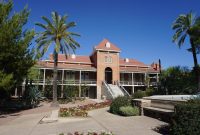The University of Winnipeg (UWinnipeg) is located in Winnipeg, Manitoba, in the heart of Canada. Winnipeg is Canada’s 7th largest city and capital city of the province of Manitoba, which has been ranked in the top three best large Canadian cities to live in and listed as one of the World’s Greatest Places of 2021 by Time Magazine.
UWinnipeg is noted for its academic excellence, small class sizes, environmental commitment, and campus diversity. The university celebrated the 50th anniversary of receiving its university charter in 2017, but its roots date back more than 145 years.

Overview
About The University of Winnipeg
Students attending the university benefit from a low student to faculty ratio and early, hands on, work and research experience. The university is highly accessible, offering the third-lowest tuition rates across Canada.
With nearly 10,000 students, 15 per cent of whom are international students from over 75 countries, UWinnipeg connects people from diverse cultures and nurtures global citizens. Located in a city where over 100 different languages are spoken, international students attending UWinnipeg can benefit from opportunities in the local job market. The university offers more than 400 high-quality undergraduate courses across 50 fields of study.
The campus is a mix of classic and modern environmentally conscious facilities. The Richardson College for the Environment and Science Complex is one of the most innovative Science complexes in Canada. It features more than 30 state-of-the-art teaching and research laboratories where students research and study the most challenging issues in society.
There is something for everyone at UWinnipeg including open green spaces, a rich array of arts and cultural activities, fitness facilities, and student groups. The campus’s vibrant downtown location allows students to advance their education while benefiting from the wide range of shops and arts and culture scenes just steps away from the campus.
What’s new
Over the last ten years, the university has invested more than CAD 217 million in the construction of new facilities and renovation of its existing structures, including CAD 66 million towards the Richardson College for the Environment and Science Complex, which attracts 2,000 students daily and features more than 30 state-of-the-art teaching and research laboratories.
The newly renovated AnX added over 11,000 square feet of space exclusively for PACE students, creating 168 new classroom seats, as well as open-concept study and lounge space, a quiet room, a boardroom, and staff offices.
The Axworthy Health and RecPlex is a multi-purpose sports facility featuring a large, multi-use turf field that can be converted into three cross-court fields for soccer, football and other field sports. There is also a four-lane sprint track, a gym, a studio for fitness activities, and lounge spaces for students or visitors.
A major capital campaign is currently underway for new library facilities on campus.
Entry requirements
The language of instruction at the University of Winnipeg is English. In order to succeed, students must have a level of ability in English that allows them to participate in all aspects of university study. If English is not the student’s first/primary language and they are not from an English exempt country, they must meet the minimum English language requirements listed on the university website.
Undergraduate
- IELTS – minimum overall score of 6.5 (no individual bands)
- Duolingo – minimum score of 120
- TOEFL – minimum score of 86, with no less than 20 in each component (internet-based test).
- English Language Program at UWinnipeg: Successful completion of Academic Level 5
- Cambridge Assessment English (C1 Advanced & C2 Proficiency) – Minimum score of 180
- Canadian Academic English Language Assessment (CAEL & CAEL CE) – minimum score of 60
- CAEL online- minimum score of 70
- Pearson Test of English (Academic)- Minimum score of 58
Visit the university website for more details and to access UWinnipeg’s English language requirement policy.
Teaching quality
UWinnipeg offers undergraduate students a large number of programs across four faculties. Arts is noted for psychology, human rights, criminal justice and theatre and film. Business and economics offer a BBA with concentration areas such as accounting, supply chain management, international business or marketing. Kinesiology offers a general stream or a science degree in athletic therapy. Science majors include biochemistry, physics, data science, environmental science, and neuroscience, among others.
Department structure
The University has six main faculties for its undergraduate and postgraduate students, including:
- Arts
- Business and Economics
- Education
- Graduate Studies
- Gupta Faculty of Kinesiology and Applied Health
- Science
As well as the 400 courses available across these faculties, the University also has other special programs that may be perfect for international students:
English Language Program (ELP)
The English Language Program provides high-quality programs for students seeking to enhance English proficiency. ELP offers a 14-week General English program, a 4-week short-term intensive program, and a 7-week Canadian Workplace Experience program, as well as English language pathways to undergraduate, graduate and PACE programs.
Professional, Applied and Continuing Education (PACE) PACE offers specialized programs such as project management, human resources, big data, etc. in high-growth career fields with strong employment prospects. PACE provides unparalleled advantages including industry-aligned programs and small class sizes that continually evolve to meet the changing needs of the job market.
The Collegiate
The University of Winnipeg Collegiate is a high school at university offering grades 9-12 Canadian school curriculum. The collegiate is noted for its accelerated courses, dual credits, and a supportive learning environment that helps students reach their full potential, develop independence, and become mature, responsible individuals who are prepared for university and a life of continued learning.

















